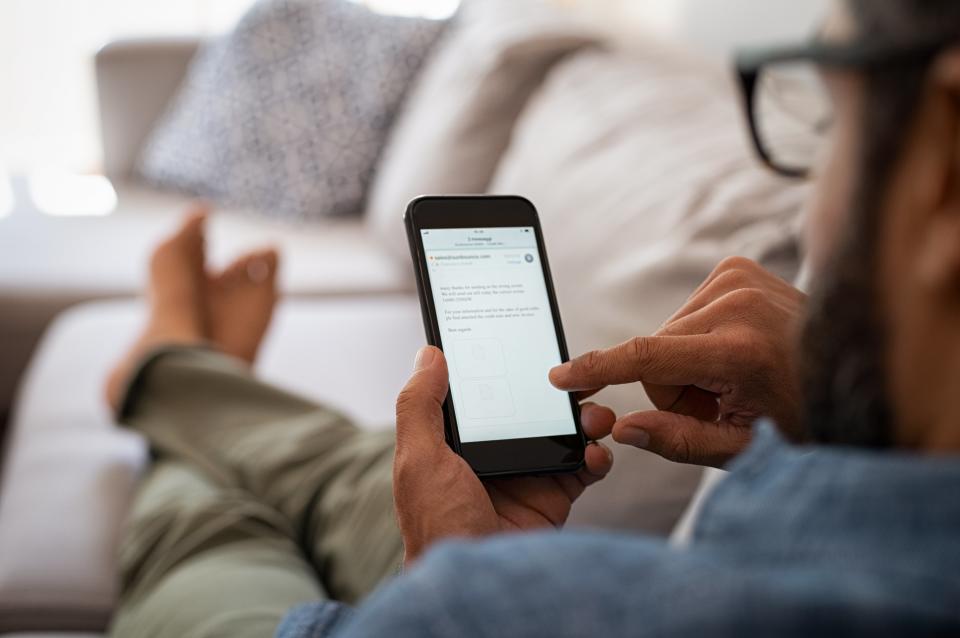Use of ‘stalkerware’ apps that allow abusers to spy on partners soar by 93% in pandemic

Spyware enables users to track an individual’s exact location, as well as access to private documents
(Getty Images/iStockphoto)The use of “deeply disturbing” apps that allow domestic abusers to spy on their partners has surged by 93 per cent since the pandemic hit Britain, new figures show.
Computer antivirus firm Avast said there were 390 spyware cases in January and February last year but this rose to 755 cases in the same period this year.
The technology – dubbed “stalkerware” – can be easily downloaded without the victim’s awareness or permission. It enables the snooper to track an individual’s exact location, as well as providing access to private images, videos, emails, texts and WhatsApp and Facebook messages.
It can also allow perpetrators to eavesdrop on phone calls and secretly record conversations.
Experts attribute the surge in individuals using the troubling software to monitor and harass their victims to the rise in domestic violence and stalking under lockdown measures.
Avast dealt with 4,585 spyware cases from March 2020 until the end of March this year.
Jaya Baloo, chief information security officer at Avast, said spyware companies are ultimately facilitating domestic abuse and stalking.
“They are abusing technology to deprive their victims of independence, privacy, and any type of autonomy,” she told The Independent. “The software is horrifically advertised. It says it is for monitoring children, monitoring employees and your loved ones. The language on it gives me the chills.”
Ms Baloo warned the rise of stalking apps is linked to the pandemic compounding abusive partners pre-existing patterns of behaviour.
Watch: Johnson ‘happy to look at new proposals’ on sexual violence
The security expert explained the technology is easy for perpetrators to access via app stores as is difficult to “vet” and “verify” – warning that keeping tabs on apps is akin to “playing Whac-A-Mole”.
She added: “They’ll be another spyware app renamed. It will reincarnate. The other place you get them from is via a random website which you can find on Google. It’s not some kid in his basement anymore. It is a legitimate business. This is not small-time stuff.”
Based on their own global data, she predicted there were millions of cases of spyware and stalkerware being installed on people’s phones around the world.
She said their figures only indicate the “tip of the iceberg” as they only come across individuals who have Avast’s software downloaded on their phone.
Ms Baloo said some of the spyware apps are free but others you have to pay for as she explained people “overestimate the complexity involved” in finding the apps.
Ms Baloo noted the only way to install such technology is to secretly do it on someone’s device but it is also possible for perpetrators to install the software remotely if they know the individuals’ cloud details.
She added: “The growth in stalkerware and spyware poses a huge concern. Stalkerware is a form of tech abuse, an increasing threat which takes away the physical and online freedom of the victim.”
Jane Keeper, director of operations at Refuge, the UK’s largest provider of shelters for domestic abuse victims, said: “This technology gives abusers another way to exert control over their victims whether we are in lockdown or not.
“Unfortunately, whilst Avast’s figures are concerning, we fear they are just the tip of the iceberg – many cases will go undetected. This is why Refuge is partnering with Avast, to help tackle this disturbing trend head-on.”
It comes after The Independent last year revealed three in four domestic abuse victims have been exposed to “controlling, humiliating or monitoring” behaviour by their former partners using technology.
Refuge, found 4,004 women seeking help in 2019 – around three-quarters of the total – had faced abuse from their ex-partner perpetrated via technology.
The tech abuse includes current or former partners using smartphones or their children’s iPads and games consoles to track a woman’s location, sharing so-called revenge porn on the internet or repeated phone calls and messages or harassment via social media. While the charity also said they have seen a rise in tech abuse cases that involve abusers using smart locks, webcams and smart heating systems to “monitor, control and gaslight” victims in the past two years.
Meanwhile, in the pandemic, domestic abuse has worsened – with calls to the UK’s national domestic abuse helpline rising and a report released by MPs at the end of April last year revealing domestic abuse killings in the first 21 days of the first lockdown were double the total of an average period in the past decade.
Calls to the National Stalking Helpline rose by 11 per cent during the public health emergency. It dealt with almost 18,000 calls from March 2020 until February this year – a substantial jump from the just over 16,000 calls the stalking helpline received in the same period a year earlier.
Anyone who requires help or support can contact the National Domestic Abuse Helpline which is open 24/7 365 days per year on 0808 2000 247 or via their website www.nationaldahelpline.org.uk/
Watch: Why do we still have a gender pay gap?
Read More
UK Covid-19 vaccinations: Latest figures
Kemi Badenoch hits out at ‘appalling abuse’ following controversial race report
‘Pervasive racism’ caused failure to commemorate Black and Asian troops, report finds
From changing rooms to public toilets: The dark trend of hidden spy cameras filming women

 Yahoo Finance
Yahoo Finance 